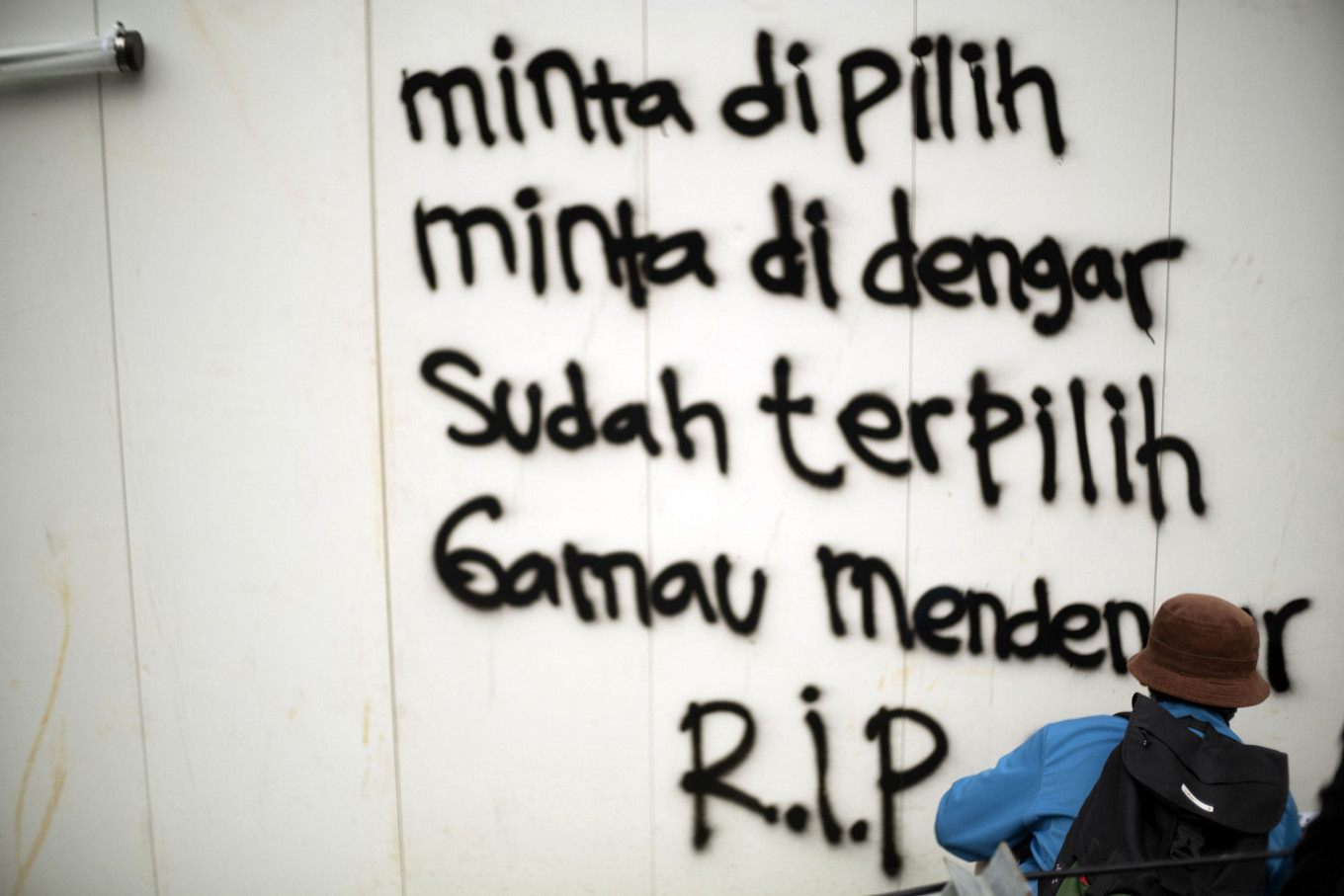Arrest of KAMI activists criticized as attempt to suppress freedom of expression
Change Size
 Words spray-painted on a wall in Jakarta reflect the sense of public betrayal that has fueled three days of nationwide demonstrations against the Job Creation Law, which the House of Representatives passed on Monday. The graffiti reads: “Asks to be elected/Asks to be heard/After [getting] elected/[They] refuse to listen. R.I.P.” (JP/Seto Wardhana)
Words spray-painted on a wall in Jakarta reflect the sense of public betrayal that has fueled three days of nationwide demonstrations against the Job Creation Law, which the House of Representatives passed on Monday. The graffiti reads: “Asks to be elected/Asks to be heard/After [getting] elected/[They] refuse to listen. R.I.P.” (JP/Seto Wardhana)
T
he recent arrest of eight people affiliated with the Save Indonesia Coalition (KAMI) over allegations of spreading hate speech and violating a sweeping online censorship law has raised concerns about the erosion of freedom of expression in the country, rights activists have said.
The figures were nabbed in a string of police operations in the capital Jakarta and in Medan, North Sumatra between Oct. 10 and 13.
The police detained KAMI executives Syahganda Nainggolan, Jumhur Hidayat, Anton Permana and Kingkin Anida in Jakarta, while in Medan, law enforcers arrested the group’s local chapter chairman Khairil Amri, along with members Juliana, Devi and Wahyu Rasari Putri.
Read also: Police arrest eight KAMI activists for alleged hate speech linked to jobs law protests
“[They] are alleged to have spread hate speech discriminating against certain groups and incited protests against the Job Creation Law that ended [in rioting],” said National Police spokesperson Brig Gen. Awi Setiyono on Tuesday.
As evidence, the police have confiscated records of their conversations over social media.
Awi said the eight detainees faced charges of violating the second paragraph of Article 45 of the Electronic Information and Transactions (ITE) Law and/or Article 160 of the Criminal Code (KUHP). The ITE Law provision carries a maximum punishment of six years’ imprisonment and a Rp 1 billion (US$67,950) fine, while the KUHP provision carries up to six years’ imprisonment.
KAMI’s Medan affiliates were transferred to Jakarta to be investigated by the National Police’s Criminal Investigation Department (Bareskrim), he added.
In a statement made available to The Jakarta Post on Wednesday, KAMI condemned the arrest of its affiliates and said they perceived it as “repressive action” that was “politically motivated”.
KAMI also criticized the police’s statement as prejudiced.
“KAMI considers the announcement made by National Police spokesman Awi Setiyono on the arrests as having elements of framing [public] opinion, tendentious overgeneralizing and of prematurely revealing conclusions in an ongoing investigation,” KAMI said in the statement, which was signed by its co-founders Din Syamsudin, Gatot Nurmantyo and Rochmat Wahab.
They also claimed there were strong indicators that the mobile phones of the KAMI executives had been hacked in recent days.
Other activists have been quick to condemn the arrests, saying that they reflect the authorities’ efforts to stifle criticism of the government relating to the controversial passage of the omnibus bill on job creation into law.
“These arrests were made to spread fear in those who criticize the passage of the Job Creation Law,” said Usman Hamid, executive director of Amnesty International Indonesia, in a statement.
“Additionally, these arrests have shown that freedom of expression in the country is under threat and that it can be seen as an effort to intimidate the opposition and those who criticize the ruling regime.”
Usman also expressed concern that the arrests had been made under the allegation of violating the ITE Law. He also called on the state to stop discriminating against its critics and that it fully respects the human rights of all people.
The KAMI arrests are just the latest in a wave of similar incidents to occur in Indonesia over the past year.
In April, independent researcher Ravio Parta was briefly detained by the police following an allegation of public incitement through his WhatsApp account, which was believed to be hacked. Ravio had turned heads for his vocal criticism of the government, including in its poor handling of the COVID-19 pandemic.
Read also: Government critic faces incitement charges after WhatsApp hacked
Mass media critical of the government have also found themselves in the crosshairs of unknown assailants.
Tempo.co, part of the Tempo Media Group that also publishes the Koran Tempo daily and the Tempo weekly magazine, as well as popular news portal tirto.id, have both been inundated by cyberattacks after publishing reports critical of the government’s handling of the COVID-19 pandemic.
According to Amnesty International Indonesia’s records, there have been at least 49 cases of alleged intimidation and hacking of government critics since February.
Others still have noted the underhanded tactics that the government and the legislature have employed to dampen criticism of the Job Creation Law, which was widely criticized for being rushed without giving fair and adequate space for the public to supervise or take part in crucial discussions.
Institute for Policy Research and Advocacy (ELSAM) deputy director Wahyudi Djafar also said he believed the KAMI arrests were carried out in an attempt to silence government critics.
“These arrests, in the context of freedom of expression, were carried out as if [authorities] wanted to create a chilling effect to [dissuade] the public from expressing their political [standpoint] for fear of incarceration,” he said.
“One of the biggest forms of threat to the ‘control’ function of [supervising] state transparency and accountability is this shackling of freedom of expression. These kinds of practices should best be avoided by the government.”









